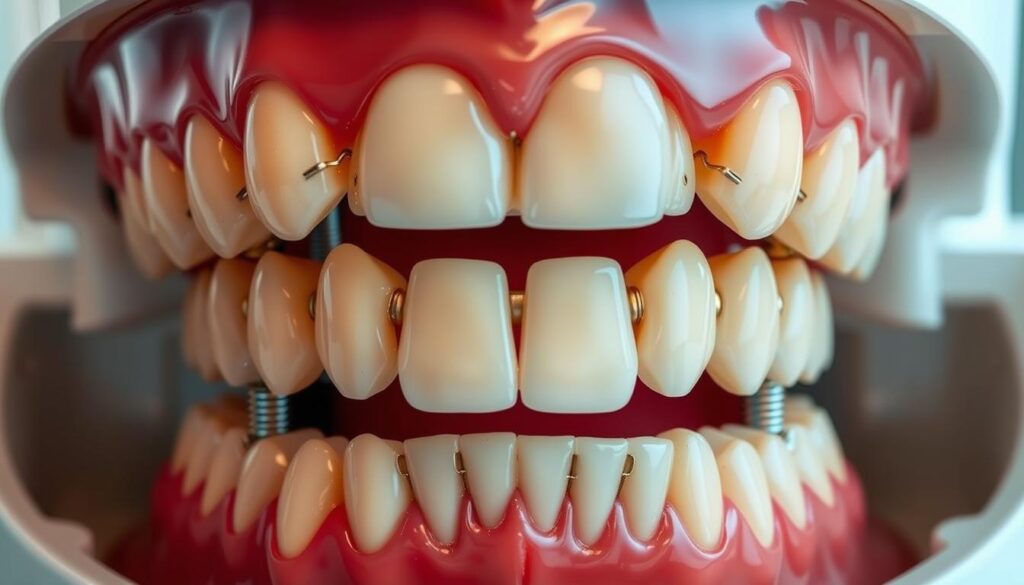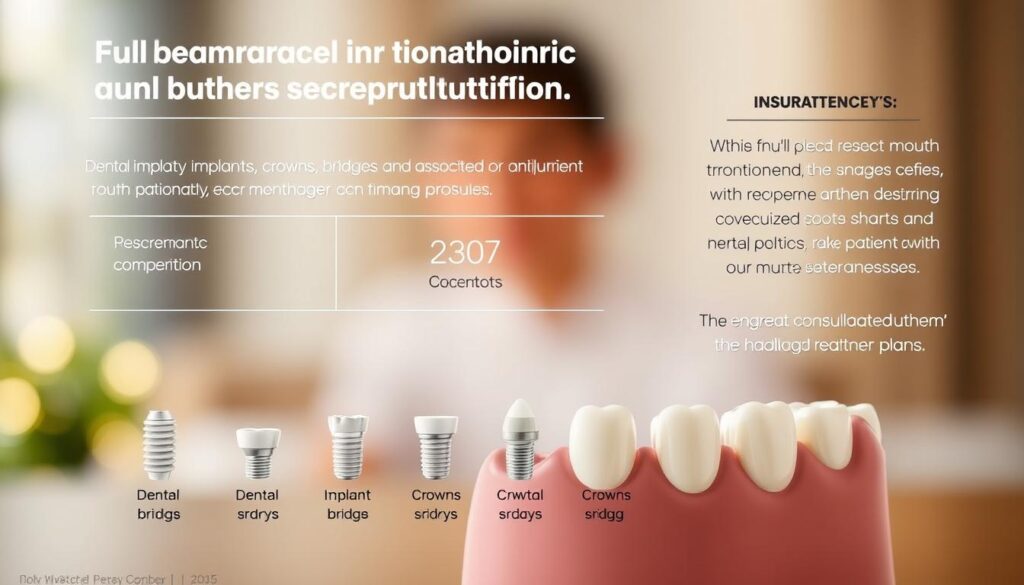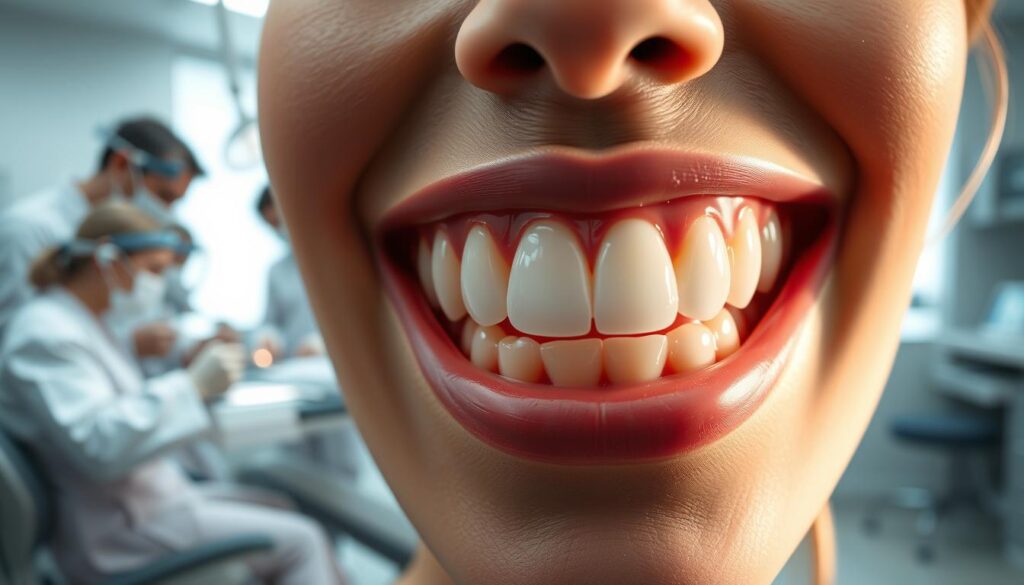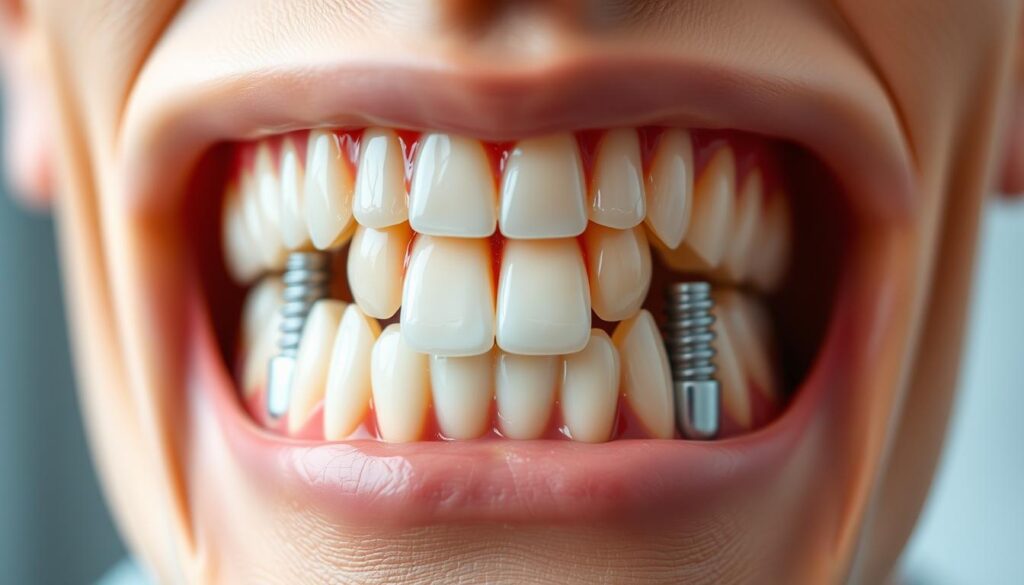As a dental solution, full mouth reconstruction is a comprehensive treatment that combines multiple procedures to restore both the function and aesthetics of a patient’s teeth. This process is designed for individuals with extensive dental issues, such as severe tooth decay, trauma, or congenital conditions.
I understand that the cost of such a significant dental investment can be a concern, as well as the uncertainty surrounding insurance coverage. Patients often need guidance on what to expect from their insurance providers and how to navigate the financial aspects of their treatment.
By rebuilding and/or replacing many or all of the natural teeth, full mouth reconstruction provides substantial aesthetic and functional improvements. As your guide, I will help you understand the financial aspects and health benefits of this significant dental investment.
Key Takeaways
- Full mouth reconstruction is a comprehensive dental treatment that combines multiple procedures.
- It addresses extensive dental issues, such as severe tooth decay and trauma.
- The cost can be significant, and insurance coverage varies.
- Understanding insurance coverage and costs is crucial for patients.
- Full mouth reconstruction provides substantial aesthetic and functional improvements.
Understanding Full Mouth Reconstruction
Rebuilding a healthy, functional smile often requires a full mouth reconstruction. This comprehensive dental procedure is designed for individuals who have multiple dental issues that need to be addressed simultaneously.
What Defines a Full Mouth Reconstruction
A full mouth reconstruction is a complex treatment plan that involves restoring or replacing multiple teeth, as well as addressing any underlying gum disease or other oral health issues. This procedure is often recommended for patients who have damaged or missing teeth due to trauma, extensive tooth decay, or gum disease. It can also be necessary for individuals with congenital conditions that impact their teeth or those experiencing severe tooth wear due to conditions like bruxism or acid reflux.

Common Reasons People Need Dental Reconstruction
There are several circumstances that might necessitate a full mouth reconstruction. Some of the most common reasons include:
- Traumatic injuries resulting in multiple damaged or lost teeth.
- Advanced periodontal disease leading to bone loss and tooth loss.
- Severe tooth wear from conditions like bruxism or acid erosion.
- Congenital conditions affecting tooth development or structure.
- Neglected dental care over many years, leading to multiple failing teeth.
These conditions highlight the importance of comprehensive dental care and the role that full mouth reconstruction can play in restoring oral health.
Types of Procedures Involved in Full Mouth Reconstruction
The process of full mouth reconstruction involves various dental procedures tailored to individual needs. Patients should expect a comprehensive approach that may include multiple treatments performed over several visits.

Periodontal Treatments and Gum Surgery
Periodontal treatments are often necessary to address gum disease and prepare the mouth for further reconstruction. Gum surgery may be required to repair or reshape the gums, ensuring a healthy foundation for other treatments.
In some cases, periodontal treatments can help save teeth that are severely infected or damaged, making them viable for restorative procedures.
Dental Implants and Artificial Teeth
Dental implants are a common component of full mouth reconstruction, providing a durable and natural-looking solution for missing teeth. The process involves surgically placing an implant, which then supports an artificial tooth.
Artificial teeth, such as crowns or bridges, are designed to match the patient’s natural teeth, restoring both function and aesthetics.
Crowns, Bridges, and Veneers
Crowns, bridges, and veneers are restorative options used in full mouth reconstruction to repair or replace damaged teeth. Crowns cover the entire tooth, while bridges fill gaps between teeth. Veneers are thin layers of material bonded to the front of teeth to improve their appearance.
These treatments can significantly enhance the overall appearance and functionality of the teeth.
Additional Restorative Procedures
Other restorative procedures, such as root canal therapy, may be necessary to address specific dental issues. Orthodontic work, including traditional braces or Invisalign, can help align teeth properly before other restorative treatments.
Bone grafting procedures may also be required to support dental implants in patients with bone loss. Additionally, TMJ treatment might be needed for patients with jaw joint dysfunction.
These additional procedures are crucial for achieving optimal long-term results in full mouth reconstruction.
Factors Affecting Full Mouth Reconstruction Cost with Insurance
Understanding the factors that impact the cost of full mouth reconstruction is crucial, especially when insurance is involved. The overall expense can vary significantly based on several key elements.
Type and Extent of Dental Damage
The type and extent of dental damage play a significant role in determining the cost of full mouth reconstruction. More extensive damage requires more complex and costly procedures. For instance, if you need a full set of dental implants, the cost will be higher compared to a partial reconstruction.
Materials Used for Restorations
The materials used for restorations, such as crowns, bridges, and veneers, can significantly affect the overall cost. High-quality materials like porcelain or ceramic are more expensive than their counterparts. The choice of material depends on durability, aesthetics, and personal preference.

Dentist’s Expertise and Geographic Location
The expertise of the dentist and the geographic location of the dental practice also influence the cost. Experienced dentists may charge more for their services, and practices located in urban areas tend to have higher fees compared to those in rural areas.
Need for Additional Treatments
Additional treatments and procedures can add to the overall cost of full mouth reconstruction. These may include preliminary treatments like extractions, bone grafting, or sinus lifts, as well as sedation options and temporary prosthetics. Post-treatment care, including specialized cleaning tools or night guards, also contributes to the total expense.
Some of the additional costs to consider include:
- Specialized imaging such as 3D CT scans, which provide valuable diagnostic information but add to the cost.
- Sedation options, ranging from nitrous oxide to IV sedation, which may be necessary for patient comfort during lengthy procedures.
- Temporary prosthetics needed during the healing phase, representing an additional expense.
- Post-treatment care, including specialized cleaning tools or night guards, which help protect the reconstruction.
By understanding these factors, you can better estimate the total cost of your full mouth reconstruction and make informed decisions about your treatment options.
Breaking Down the Costs: Procedure by Procedure
Understanding the financial aspects of full mouth reconstruction is crucial for patients. This complex dental treatment involves multiple procedures, each with its associated costs. By breaking down these costs, patients can better understand what to expect and plan accordingly.
Dental Implant Costs
Dental implants are a common component of full mouth reconstruction. The cost of a single dental implant can range widely, typically between $1,500 to $6,000, depending on factors like the implant material and the complexity of the procedure. High-quality implants and experienced surgeons may charge more, but they often result in better outcomes and longer durability.
Crown and Bridge Pricing
Crowns and bridges are used to restore teeth damaged or missing during the reconstruction process. The cost for crowns can vary from $800 to $1,500 per crown, while bridges range from $2,000 to $5,000 or more, depending on the number of teeth involved. Material choices, such as porcelain or ceramic, can affect the final cost.

Periodontal Treatment Expenses
Periodontal treatments, including gum surgery, are often necessary to address gum disease before other reconstruction procedures can begin. These treatments can cost anywhere from $1,000 to $4,000 or more, depending on the severity of the gum disease and the treatments required.
Orthodontic Work and Other Procedures
Orthodontic work, such as traditional braces or Invisalign, may be necessary to align teeth properly before final restorations. Costs for orthodontic treatment can range from $3,000 to $8,000 for traditional braces and $1,200 to $8,000 for Invisalign. Other procedures, like root canal therapy ($800-$1,500 per tooth) and tooth extractions ($150-$650 per tooth), may also be required. Diagnostic procedures like 3D imaging ($300-$500) are additional costs that contribute to the overall expense.
- Orthodontic treatment options vary in cost and complexity.
- Endodontic procedures like root canal therapy are sometimes necessary.
- Tooth extractions may be required for severely damaged teeth.
- Diagnostic imaging is an essential, though often overlooked, cost.
The sequencing and timing of these procedures can significantly affect the overall treatment timeline and distribution of costs. Understanding these factors helps patients prepare financially for their full mouth reconstruction.
Insurance Coverage for Full Mouth Reconstruction

Insurance coverage plays a vital role in making full mouth reconstruction financially manageable. Full mouth reconstruction involves a range of dental procedures, and understanding what is covered by insurance can significantly impact the overall cost.
What Dental Insurance Typically Covers
Dental insurance plans vary in their coverage, but most typically cover a portion of the costs associated with full mouth reconstruction. This can include periodontal treatments, dental implants, crowns, bridges, and veneers. However, the extent of coverage depends on the specific insurance provider and the details of the plan.
Medical vs. Dental Insurance Considerations
In some cases, medical insurance may cover certain aspects of full mouth reconstruction, especially if the procedures are deemed medically necessary. For instance, if dental issues are related to a medical condition, medical insurance might cover some of the treatments. It’s essential to consult with both dental and medical insurance providers to understand the coverage.
Insurance Limitations and Maximums
Dental insurance plans often come with annual maximum benefit limitations, typically ranging from $1,000 to $2,000. This can severely restrict coverage for extensive reconstruction. Additionally, waiting periods, pre-existing condition clauses, frequency limitations, and lifetime maximums for certain procedures can further limit coverage. Understanding these limitations is crucial for planning.
By grasping the intricacies of insurance coverage, patients can better navigate the financial aspects of full mouth reconstruction and make informed decisions about their care.
Financing Options When Insurance Isn’t Enough

When insurance coverage falls short, exploring alternative financing options becomes crucial for managing the cost of full mouth reconstruction. Patients often need to consider various financial plans to afford this comprehensive dental treatment.
Dental Payment Plans
Dental payment plans allow patients to spread the cost of full mouth reconstruction over time, making the treatment more manageable. These plans are often interest-free or have low interest rates, and they can be tailored to fit individual budgets.
Medical Credit Cards and Loans
Medical credit cards and loans provide another financing avenue for patients. These financial tools are specifically designed for medical and dental expenses, offering flexible repayment terms and competitive interest rates.
Health Savings Accounts (HSAs) and Flexible Spending Accounts (FSAs)
Health Savings Accounts (HSAs) and Flexible Spending Accounts (FSAs) enable patients to use pre-tax dollars for qualified medical expenses, including many dental procedures involved in full mouth reconstruction. Components like dental implants, crowns, and periodontal treatments typically qualify for HSA/FSA spending, provided they are deemed medically necessary.
The annual contribution limits for these accounts are $3,850 for individual HSAs and $2,850 for FSAs (as of 2023). Understanding the differences between HSAs and FSAs, including rollover provisions and account ownership, is crucial for maximizing their utility in long-term treatment plans.
Benefits of Investing in Full Mouth Reconstruction
Full mouth reconstruction offers numerous benefits that can significantly improve one’s quality of life. By addressing extensive dental issues comprehensively, individuals can experience improvements in both oral health and overall well-being.
Functional Improvements and Oral Health
One of the primary benefits of full mouth reconstruction is the restoration of oral function. By correcting dental issues such as missing teeth, misaligned bites, and gum disease, individuals can enjoy improved chewing and speaking abilities. This comprehensive approach to dental care also enhances oral health by eliminating the sources of potential infections and reducing the risk of further dental complications.
- Prevents more serious dental problems
- Reduces the risk of oral infections
- Improves overall oral health
Aesthetic Benefits and Confidence Restoration
Full mouth reconstruction not only improves oral function but also significantly enhances the aesthetic appeal of one’s smile. By addressing issues such as discoloration, misalignment, and missing teeth, individuals can achieve a more youthful and attractive appearance. This transformation can boost self-confidence, allowing individuals to smile and interact with others without feeling self-conscious about their teeth.

Long-term Health and Financial Benefits
Investing in full mouth reconstruction can have long-term health and financial benefits. By using durable modern materials and techniques, patients can enjoy decades of service from their dental restorations. This approach eliminates the need for repeated patchwork repairs, potentially saving money over time. Moreover, improved oral health reduces the need for future dental care, lowering overall healthcare costs.
Conclusion
In conclusion, full mouth reconstruction is a significant investment in one’s oral health and overall wellbeing. While the cost can be substantial, the benefits often justify the expense. Working with an experienced dentist is crucial in creating a customized treatment plan that addresses both functional needs and financial considerations.
It’s essential to thoroughly investigate your insurance coverage and financing options to understand the financial implications. Requesting pre-treatment estimates from your insurance providers can help clarify the extent of your coverage.
Full mouth reconstruction is not merely a cosmetic luxury; it’s often a necessary intervention for oral health, function, and overall wellbeing. The transformation of both oral health and quality of life can make full mouth reconstruction a worthwhile investment. By understanding the procedures involved and the associated costs, individuals can make informed decisions about their smile and overall health.
FAQ
What is the average cost of a dental implant?
How much does a dental crown typically cost?
FAQ
What is the average cost of a dental implant?
The cost of a dental implant can vary, but on average, it can range from ,000 to ,500 per implant, depending on the complexity of the procedure and the materials used.
How much does a dental crown typically cost?
The cost of a dental crown can vary depending on the material used, with prices ranging from 0 to
FAQ
What is the average cost of a dental implant?
The cost of a dental implant can vary, but on average, it can range from $3,000 to $4,500 per implant, depending on the complexity of the procedure and the materials used.
How much does a dental crown typically cost?
The cost of a dental crown can vary depending on the material used, with prices ranging from $500 to $1,500 per crown.
Will my dental insurance cover the cost of a root canal?
Many dental insurance plans cover a portion of the cost of a root canal, but the extent of coverage varies depending on the insurance provider and the specific plan.
What factors affect the overall reconstruction cost?
The overall reconstruction cost is influenced by the type and extent of dental damage, the materials used for restorations, the dentist’s expertise, and the need for additional treatments.
Can I use a Health Savings Account (HSA) to pay for dental procedures?
Yes, you can use an HSA to pay for eligible dental expenses, including certain restorative procedures and treatments.
How long does a dental implant procedure typically take?
The length of a dental implant procedure can vary, but it typically involves multiple appointments over several months, including the initial consultation, implant placement, and restoration.
Are dental bridges a cost-effective option for replacing missing teeth?
Dental bridges can be a cost-effective option for replacing missing teeth, with prices ranging from $500 to $1,500 per bridge, depending on the materials used and the complexity of the procedure.
What are the benefits of using porcelain for dental restorations?
Porcelain is a popular choice for dental restorations due to its durability, aesthetic appeal, and ability to be matched to the color of natural teeth.
,500 per crown.
Will my dental insurance cover the cost of a root canal?
Many dental insurance plans cover a portion of the cost of a root canal, but the extent of coverage varies depending on the insurance provider and the specific plan.
What factors affect the overall reconstruction cost?
The overall reconstruction cost is influenced by the type and extent of dental damage, the materials used for restorations, the dentist’s expertise, and the need for additional treatments.
Can I use a Health Savings Account (HSA) to pay for dental procedures?
Yes, you can use an HSA to pay for eligible dental expenses, including certain restorative procedures and treatments.
How long does a dental implant procedure typically take?
The length of a dental implant procedure can vary, but it typically involves multiple appointments over several months, including the initial consultation, implant placement, and restoration.
Are dental bridges a cost-effective option for replacing missing teeth?
Dental bridges can be a cost-effective option for replacing missing teeth, with prices ranging from 0 to
FAQ
What is the average cost of a dental implant?
The cost of a dental implant can vary, but on average, it can range from $3,000 to $4,500 per implant, depending on the complexity of the procedure and the materials used.
How much does a dental crown typically cost?
The cost of a dental crown can vary depending on the material used, with prices ranging from $500 to $1,500 per crown.
Will my dental insurance cover the cost of a root canal?
Many dental insurance plans cover a portion of the cost of a root canal, but the extent of coverage varies depending on the insurance provider and the specific plan.
What factors affect the overall reconstruction cost?
The overall reconstruction cost is influenced by the type and extent of dental damage, the materials used for restorations, the dentist’s expertise, and the need for additional treatments.
Can I use a Health Savings Account (HSA) to pay for dental procedures?
Yes, you can use an HSA to pay for eligible dental expenses, including certain restorative procedures and treatments.
How long does a dental implant procedure typically take?
The length of a dental implant procedure can vary, but it typically involves multiple appointments over several months, including the initial consultation, implant placement, and restoration.
Are dental bridges a cost-effective option for replacing missing teeth?
Dental bridges can be a cost-effective option for replacing missing teeth, with prices ranging from $500 to $1,500 per bridge, depending on the materials used and the complexity of the procedure.
What are the benefits of using porcelain for dental restorations?
Porcelain is a popular choice for dental restorations due to its durability, aesthetic appeal, and ability to be matched to the color of natural teeth.
,500 per bridge, depending on the materials used and the complexity of the procedure.
What are the benefits of using porcelain for dental restorations?
Porcelain is a popular choice for dental restorations due to its durability, aesthetic appeal, and ability to be matched to the color of natural teeth.
FAQ
What is the average cost of a dental implant?
The cost of a dental implant can vary, but on average, it can range from ,000 to ,500 per implant, depending on the complexity of the procedure and the materials used.
How much does a dental crown typically cost?
The cost of a dental crown can vary depending on the material used, with prices ranging from 0 to
FAQ
What is the average cost of a dental implant?
The cost of a dental implant can vary, but on average, it can range from $3,000 to $4,500 per implant, depending on the complexity of the procedure and the materials used.
How much does a dental crown typically cost?
The cost of a dental crown can vary depending on the material used, with prices ranging from $500 to $1,500 per crown.
Will my dental insurance cover the cost of a root canal?
Many dental insurance plans cover a portion of the cost of a root canal, but the extent of coverage varies depending on the insurance provider and the specific plan.
What factors affect the overall reconstruction cost?
The overall reconstruction cost is influenced by the type and extent of dental damage, the materials used for restorations, the dentist’s expertise, and the need for additional treatments.
Can I use a Health Savings Account (HSA) to pay for dental procedures?
Yes, you can use an HSA to pay for eligible dental expenses, including certain restorative procedures and treatments.
How long does a dental implant procedure typically take?
The length of a dental implant procedure can vary, but it typically involves multiple appointments over several months, including the initial consultation, implant placement, and restoration.
Are dental bridges a cost-effective option for replacing missing teeth?
Dental bridges can be a cost-effective option for replacing missing teeth, with prices ranging from $500 to $1,500 per bridge, depending on the materials used and the complexity of the procedure.
What are the benefits of using porcelain for dental restorations?
Porcelain is a popular choice for dental restorations due to its durability, aesthetic appeal, and ability to be matched to the color of natural teeth.
,500 per crown.
Will my dental insurance cover the cost of a root canal?
Many dental insurance plans cover a portion of the cost of a root canal, but the extent of coverage varies depending on the insurance provider and the specific plan.
What factors affect the overall reconstruction cost?
The overall reconstruction cost is influenced by the type and extent of dental damage, the materials used for restorations, the dentist’s expertise, and the need for additional treatments.
Can I use a Health Savings Account (HSA) to pay for dental procedures?
Yes, you can use an HSA to pay for eligible dental expenses, including certain restorative procedures and treatments.
How long does a dental implant procedure typically take?
The length of a dental implant procedure can vary, but it typically involves multiple appointments over several months, including the initial consultation, implant placement, and restoration.
Are dental bridges a cost-effective option for replacing missing teeth?
Dental bridges can be a cost-effective option for replacing missing teeth, with prices ranging from 0 to
FAQ
What is the average cost of a dental implant?
The cost of a dental implant can vary, but on average, it can range from $3,000 to $4,500 per implant, depending on the complexity of the procedure and the materials used.
How much does a dental crown typically cost?
The cost of a dental crown can vary depending on the material used, with prices ranging from $500 to $1,500 per crown.
Will my dental insurance cover the cost of a root canal?
Many dental insurance plans cover a portion of the cost of a root canal, but the extent of coverage varies depending on the insurance provider and the specific plan.
What factors affect the overall reconstruction cost?
The overall reconstruction cost is influenced by the type and extent of dental damage, the materials used for restorations, the dentist’s expertise, and the need for additional treatments.
Can I use a Health Savings Account (HSA) to pay for dental procedures?
Yes, you can use an HSA to pay for eligible dental expenses, including certain restorative procedures and treatments.
How long does a dental implant procedure typically take?
The length of a dental implant procedure can vary, but it typically involves multiple appointments over several months, including the initial consultation, implant placement, and restoration.
Are dental bridges a cost-effective option for replacing missing teeth?
Dental bridges can be a cost-effective option for replacing missing teeth, with prices ranging from $500 to $1,500 per bridge, depending on the materials used and the complexity of the procedure.
What are the benefits of using porcelain for dental restorations?
Porcelain is a popular choice for dental restorations due to its durability, aesthetic appeal, and ability to be matched to the color of natural teeth.
,500 per bridge, depending on the materials used and the complexity of the procedure.
What are the benefits of using porcelain for dental restorations?
Porcelain is a popular choice for dental restorations due to its durability, aesthetic appeal, and ability to be matched to the color of natural teeth.
Will my dental insurance cover the cost of a root canal?
What factors affect the overall reconstruction cost?
Can I use a Health Savings Account (HSA) to pay for dental procedures?
How long does a dental implant procedure typically take?
Are dental bridges a cost-effective option for replacing missing teeth?
FAQ
What is the average cost of a dental implant?
The cost of a dental implant can vary, but on average, it can range from ,000 to ,500 per implant, depending on the complexity of the procedure and the materials used.
How much does a dental crown typically cost?
The cost of a dental crown can vary depending on the material used, with prices ranging from 0 to
FAQ
What is the average cost of a dental implant?
The cost of a dental implant can vary, but on average, it can range from $3,000 to $4,500 per implant, depending on the complexity of the procedure and the materials used.
How much does a dental crown typically cost?
The cost of a dental crown can vary depending on the material used, with prices ranging from $500 to $1,500 per crown.
Will my dental insurance cover the cost of a root canal?
Many dental insurance plans cover a portion of the cost of a root canal, but the extent of coverage varies depending on the insurance provider and the specific plan.
What factors affect the overall reconstruction cost?
The overall reconstruction cost is influenced by the type and extent of dental damage, the materials used for restorations, the dentist’s expertise, and the need for additional treatments.
Can I use a Health Savings Account (HSA) to pay for dental procedures?
Yes, you can use an HSA to pay for eligible dental expenses, including certain restorative procedures and treatments.
How long does a dental implant procedure typically take?
The length of a dental implant procedure can vary, but it typically involves multiple appointments over several months, including the initial consultation, implant placement, and restoration.
Are dental bridges a cost-effective option for replacing missing teeth?
Dental bridges can be a cost-effective option for replacing missing teeth, with prices ranging from $500 to $1,500 per bridge, depending on the materials used and the complexity of the procedure.
What are the benefits of using porcelain for dental restorations?
Porcelain is a popular choice for dental restorations due to its durability, aesthetic appeal, and ability to be matched to the color of natural teeth.
,500 per crown.
Will my dental insurance cover the cost of a root canal?
Many dental insurance plans cover a portion of the cost of a root canal, but the extent of coverage varies depending on the insurance provider and the specific plan.
What factors affect the overall reconstruction cost?
The overall reconstruction cost is influenced by the type and extent of dental damage, the materials used for restorations, the dentist’s expertise, and the need for additional treatments.
Can I use a Health Savings Account (HSA) to pay for dental procedures?
Yes, you can use an HSA to pay for eligible dental expenses, including certain restorative procedures and treatments.
How long does a dental implant procedure typically take?
The length of a dental implant procedure can vary, but it typically involves multiple appointments over several months, including the initial consultation, implant placement, and restoration.
Are dental bridges a cost-effective option for replacing missing teeth?
Dental bridges can be a cost-effective option for replacing missing teeth, with prices ranging from 0 to
FAQ
What is the average cost of a dental implant?
The cost of a dental implant can vary, but on average, it can range from $3,000 to $4,500 per implant, depending on the complexity of the procedure and the materials used.
How much does a dental crown typically cost?
The cost of a dental crown can vary depending on the material used, with prices ranging from $500 to $1,500 per crown.
Will my dental insurance cover the cost of a root canal?
Many dental insurance plans cover a portion of the cost of a root canal, but the extent of coverage varies depending on the insurance provider and the specific plan.
What factors affect the overall reconstruction cost?
The overall reconstruction cost is influenced by the type and extent of dental damage, the materials used for restorations, the dentist’s expertise, and the need for additional treatments.
Can I use a Health Savings Account (HSA) to pay for dental procedures?
Yes, you can use an HSA to pay for eligible dental expenses, including certain restorative procedures and treatments.
How long does a dental implant procedure typically take?
The length of a dental implant procedure can vary, but it typically involves multiple appointments over several months, including the initial consultation, implant placement, and restoration.
Are dental bridges a cost-effective option for replacing missing teeth?
Dental bridges can be a cost-effective option for replacing missing teeth, with prices ranging from $500 to $1,500 per bridge, depending on the materials used and the complexity of the procedure.
What are the benefits of using porcelain for dental restorations?
Porcelain is a popular choice for dental restorations due to its durability, aesthetic appeal, and ability to be matched to the color of natural teeth.
,500 per bridge, depending on the materials used and the complexity of the procedure.
What are the benefits of using porcelain for dental restorations?
Porcelain is a popular choice for dental restorations due to its durability, aesthetic appeal, and ability to be matched to the color of natural teeth.
FAQ
What is the average cost of a dental implant?
The cost of a dental implant can vary, but on average, it can range from ,000 to ,500 per implant, depending on the complexity of the procedure and the materials used.
How much does a dental crown typically cost?
The cost of a dental crown can vary depending on the material used, with prices ranging from 0 to
FAQ
What is the average cost of a dental implant?
The cost of a dental implant can vary, but on average, it can range from $3,000 to $4,500 per implant, depending on the complexity of the procedure and the materials used.
How much does a dental crown typically cost?
The cost of a dental crown can vary depending on the material used, with prices ranging from $500 to $1,500 per crown.
Will my dental insurance cover the cost of a root canal?
Many dental insurance plans cover a portion of the cost of a root canal, but the extent of coverage varies depending on the insurance provider and the specific plan.
What factors affect the overall reconstruction cost?
The overall reconstruction cost is influenced by the type and extent of dental damage, the materials used for restorations, the dentist’s expertise, and the need for additional treatments.
Can I use a Health Savings Account (HSA) to pay for dental procedures?
Yes, you can use an HSA to pay for eligible dental expenses, including certain restorative procedures and treatments.
How long does a dental implant procedure typically take?
The length of a dental implant procedure can vary, but it typically involves multiple appointments over several months, including the initial consultation, implant placement, and restoration.
Are dental bridges a cost-effective option for replacing missing teeth?
Dental bridges can be a cost-effective option for replacing missing teeth, with prices ranging from $500 to $1,500 per bridge, depending on the materials used and the complexity of the procedure.
What are the benefits of using porcelain for dental restorations?
Porcelain is a popular choice for dental restorations due to its durability, aesthetic appeal, and ability to be matched to the color of natural teeth.
,500 per crown.
Will my dental insurance cover the cost of a root canal?
Many dental insurance plans cover a portion of the cost of a root canal, but the extent of coverage varies depending on the insurance provider and the specific plan.
What factors affect the overall reconstruction cost?
The overall reconstruction cost is influenced by the type and extent of dental damage, the materials used for restorations, the dentist’s expertise, and the need for additional treatments.
Can I use a Health Savings Account (HSA) to pay for dental procedures?
Yes, you can use an HSA to pay for eligible dental expenses, including certain restorative procedures and treatments.
How long does a dental implant procedure typically take?
The length of a dental implant procedure can vary, but it typically involves multiple appointments over several months, including the initial consultation, implant placement, and restoration.
Are dental bridges a cost-effective option for replacing missing teeth?
Dental bridges can be a cost-effective option for replacing missing teeth, with prices ranging from 0 to
FAQ
What is the average cost of a dental implant?
The cost of a dental implant can vary, but on average, it can range from $3,000 to $4,500 per implant, depending on the complexity of the procedure and the materials used.
How much does a dental crown typically cost?
The cost of a dental crown can vary depending on the material used, with prices ranging from $500 to $1,500 per crown.
Will my dental insurance cover the cost of a root canal?
Many dental insurance plans cover a portion of the cost of a root canal, but the extent of coverage varies depending on the insurance provider and the specific plan.
What factors affect the overall reconstruction cost?
The overall reconstruction cost is influenced by the type and extent of dental damage, the materials used for restorations, the dentist’s expertise, and the need for additional treatments.
Can I use a Health Savings Account (HSA) to pay for dental procedures?
Yes, you can use an HSA to pay for eligible dental expenses, including certain restorative procedures and treatments.
How long does a dental implant procedure typically take?
The length of a dental implant procedure can vary, but it typically involves multiple appointments over several months, including the initial consultation, implant placement, and restoration.
Are dental bridges a cost-effective option for replacing missing teeth?
Dental bridges can be a cost-effective option for replacing missing teeth, with prices ranging from $500 to $1,500 per bridge, depending on the materials used and the complexity of the procedure.
What are the benefits of using porcelain for dental restorations?
Porcelain is a popular choice for dental restorations due to its durability, aesthetic appeal, and ability to be matched to the color of natural teeth.
,500 per bridge, depending on the materials used and the complexity of the procedure.
What are the benefits of using porcelain for dental restorations?
Porcelain is a popular choice for dental restorations due to its durability, aesthetic appeal, and ability to be matched to the color of natural teeth.
